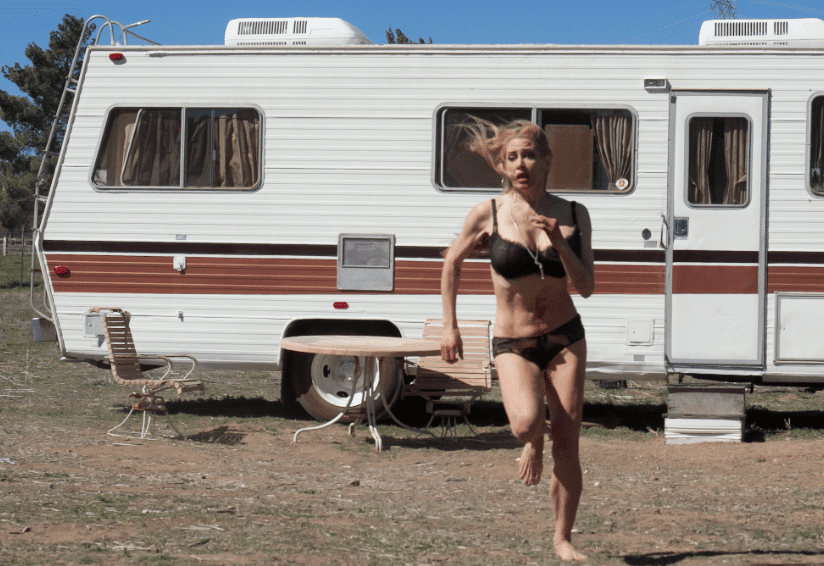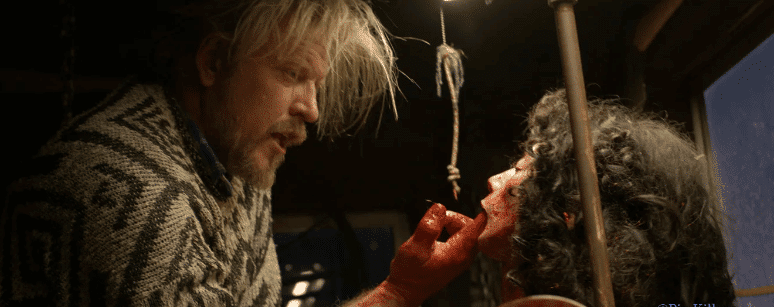
With a title like Pig Killer, you know you’d be mad to expect a philosophical work, some light moral lessons or charming whimsy. That much is perfectly clear. What you may be less prepared for, though, is just how deliberately low the film aims. Wherever the ‘acceptable level’ is, it elects to nosedive past that, landing in a morass of body parts and blaring incidental music some distance further down.
Now, depending on your outlook, you may feel that this is a stirring recommendation; if so, have at it. Lots of people love their horror splattery and a certain kind of provocative; director and writer Chad Ferrin has you covered. For others, living through a period in time where dramatic explorations of the serial killer phenomenon have grown increasingly sensitive, well-written and (mostly) respectful, Pig Killer may well feel like a bizarre throwback. It is, after all, based loosely on the real story of Canadian serial killer, Willy Pickton: this marks it out as something other than a straight-up fantasy about a bad man who kills women. When the inspiration is perfectly real, when victims’ families may well be still alive, it will make it far more difficult to nod this stuff through – for many viewers, at least.
We start as we mean to go on, with a long sequence running through the opening credits of pigs tucking into human body parts, as an as-yet faceless man oversees. This is pig farmer Willy (Jake Busey) who later unwinds from all of this with a visit to a local bar. It seems he’s planning a big party, or a ‘piggy pow-wow’ and has printed out flyers for the occasion; it’s a last hurrah before he completes the sale on his land, it seems. After that, it’s off to the red light district to pick up an Asian stereotype and to murder her – then to have sex with her, with one of the film’s prosthetic penises appearing on camera for the occasion. (Or perhaps it’s the same prosthetic penis, passed around between several actors.) Anyway, as he does this, he stops seeing his victim and starts to see his mother in her place (played by Ginger Lynn). This use of flashback recurs regularly, filling in the back story of an unhappy childhood and its key events. It’s also a stock way of reaffirming Willy’s disturbed mental state; the notion, though, is a tried-and-tested one: abnormal experiences of sexuality have made him the man he is today.
It’s also made clear to us, via dialogue and cut scenes, that one of the other punters at the bar, a troubled young woman called Wendy (Kate Patel) and our pig farmer are going to cross paths. We know she’s already asked after the farmer; a friend fills her in on his dark reputation. We also know about the rumours that ‘women go free’ to these parties, and don’t all come out again. A lot hinges on the planned pow-wow then, which will go ahead come what may – despite the fact that talk of selling the farm kicks up a lot of dirt between Willy and his slightly more functional brother David (Lew Temple), who are reminded of their unhappy memories of the place.
It starts gratuitously, and so it can never be said that the film lulls its audience into a false sense of security, or indicates that it will be one thing and not another. It seems to be channelling a lot of those slightly mysterious VHS films you could stumble upon, back in the day, and only wonder at how in the hell anyone had managed to make something so apparently organically disturbing; there was a genuine sense of curiosity then, back when films could surface and disappear and there was no IMDb to lend context to what you had just watched. Things are different now, and even homage has to work carefully. To take this approach today suggests intent: it suggests that all of the film’s key elements – script, performances, scene selections, plot – have been chosen here in full knowledge of a few things, not least that the relationship between the real case and this film may raise eyebrows.
‘Cartoonish’ is a bold stylistic decision to go for then, given all of this, but this is a nonetheless a bizarrely cartoonish film, but one which feels neither genuinely challenging nor compelling, certainly not across two hours – which is far, far too long to sustain interest. The blaring background and incidental music drown out the dialogue a lot of the time, which doesn’t help. There are issues here, then. That’s not to say that Busey doesn’t give it his all, or that he isn’t supported well by the rest of the cast, who no doubt do exactly what they were directed to do. This isn’t a bad looking film, either, with a range of shots and some ingenious uses of practical SFX on a clear budget. It’s just that, overall, these kinds of two-dimensional rape and murder-fests feel dated; if ‘dated’ is the aim, then fine, but they still need more than this because even shock value is a far trickier customer today.
Pig Killer (2022) premiered at the Sydney Underground Festival and will continue its festival run through October.
